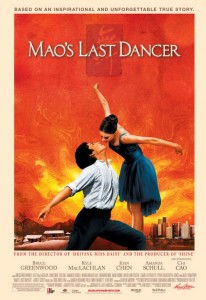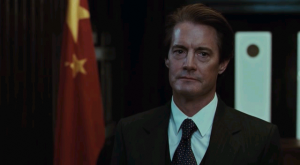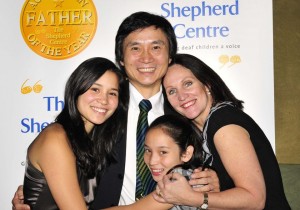Just For Fun: Movie Review – Mao’s Last Dancer
Mao’s Last Dancer tells the true story of ballet dancer Li Cunxin’s defection to the United States in 1981. The film is fairly average, not particularly well-acted (aside from Bruce Greenwood who plays the complex character of Houston Ballet choreographer Ben Stevenson and does a superb job) and at times way too dramatic. Joan Chen makes an appearance as a poor Chinese peasant, raising seven sons in the stark mountainous countryside of Shangdong province, and of course, looks as beautiful as ever.
tells the true story of ballet dancer Li Cunxin’s defection to the United States in 1981. The film is fairly average, not particularly well-acted (aside from Bruce Greenwood who plays the complex character of Houston Ballet choreographer Ben Stevenson and does a superb job) and at times way too dramatic. Joan Chen makes an appearance as a poor Chinese peasant, raising seven sons in the stark mountainous countryside of Shangdong province, and of course, looks as beautiful as ever.
But the movie is not a complete wash out in that it takes a snapshot of a very important time in U.S.-China relations and tells the story of a tense 21-hour period in this new-found relationship.
The film opens in Li’s impoverished home village outside of Qingdao, Shangdong Province. It is 1972, the height of China’s Cultural Revolution, socialist rhetoric is running high and Li is 11 years old. When Party officials visit his mud-walled school, Li is selected for a competition in which the winning students will be sent to Beijing to study. It’s not until the next day, when Li is asked to do various tumbles, twists, and handstands that his family finally realizes he has being selected to attend the Beijing Dance Academy. The director, Bruce Beresford (Driving Miss Daisy), does a great job of distinguishing the feelings of the two generations – Li’s parents want him to go to Beijing because they know that this will offer their son a better life; Li goes because he feels a sincere sense of obligation to his motherland. And that is what is great about this movie – in a very nuanced way it shows the sincerity of the young people’s belief in the teachings of the Cultural Revolution. Li was born on the eve of the Cultural Revolution and his whole life he has been indoctrinated with its teachings and has come to believe them. No other movie I have seen about the Cultural Revolution has been able to effectively capture this subtle fact.
Fast-forward nine years (note: plot spoiler!) and Li is a star. At least in China. He performs twice for Chairman Mao’s wife, Jiang Qing, and when Ben Stevenson arrives as part of the various “good will” cultural tours immediately after China and the U.S. normalized relations, Li is the only dancer he considers talented. As a result, Stevenson invites Li to study in Houston as an exchange student for six weeks in the summer of 1981.
Ensues are various skits about Li adjusting to American life – the usual “look how different America is from China”, “look at the extravagant Americans” scenes. But eventually Li becomes a star, performing the lead role in one of the Houston Ballet Company’s premier summer events. Li also begins dating one of the American ballerinas. Needless to say, Li doesn’t want to go back when his time has come but because the Chinese government fears that Li is getting too soft, does not allow him to extend his visa.
Li speaks to a lawyer (played very well by former Twin Peaks star Kyle MacLachlan) about his options, and (note: plot spoiler!) rushes into a hasty marriage to his American girlfriend. When he goes to tell the Chinese consulate, he is kidnapped and held in the consulate for 21 hours. With the help of his attorney and the Department of State, Li is eventually freed but informed that he has been stripped of his Chinese citizenship and will not be permitted to ever return to China.
And this is where the movie gets weak. We are never told what propels Li to choose America over his family. How was he able to so easily break with the Communist rhetoric that he had learned his whole life (when he first shows up to America, he is constantly wearing his Mao pin)? Aside from having sex with his girlfriend, we never see Li getting close with anyone in America. How did he leave his whole family? Was it just his youth? There is so much here that the director could have easily used to better explain Li’s choice. Instead, it seems to be a mechanical decision and on some level plays on the Western bias of “well of course he would want to live in the West.” It wasn’t until I got home, researched Li Cunxin and read excerpts from his autobiography that I learned that his rejection of the Communist teachings was actually an important part of his decision.
But even in light of that, being reminded of the relationship between China and the U.S. soon after normalization in 1979, is an important thing, especially for younger China watchers. China did not really enter my orbit until the early 1990s. And by then, it was a very different China. Seeing a China just entering its Reform & Opening period, and watching the U.S. and China (note: plot spoiler!) coordinate efforts to reunite Li with his parents at one of his performance (note, melodrama runs high in this scene) reminds us of a time when symbolic good-will gestures between the U.S. and China helped move a relationship forward. How times have changed.
For the historical value, for some of the nuanced scenes of political indoctrination, Bruce Greenwood’s performance, and for the scenes filmed in China, it is worth watching. But wait till it comes out on DVD.
Rating: 




This movie is now available on DVD: Mao’s Last Dancer
 On Facebook
On Facebook By Email
By Email 


Sorry the last statement is not true. He actually divorced and remarried and his daughters are by his current wife.
I dissagree with the review. There is indeed show of his reasons he made the decision. Love is a strong motivation to move across country. How many centuries have women left their home and family because of love and marriage?
Also as far as his family was concern he was taken from his family and put into a school of ballet cut off from them for most of his formative years. So it wasn’t like he was allowed much contact with them in the first place accept for phone calls and letters. One of the hesitations about him going to America was they didn’t believe he had been mentally politically “sterlized” enough.
I think showing how motivated he was to become not just a techinical dancer but a passionate dancer after watching the video tape his teacher left him he would always be open to the non-communist way of if not living, then the way of dance. Also, more likely than not, he was as virginal as his future wife and being each other’s first love was even a stronger motivation for him to want to stay.
I think it was made clear in the film that his defecting wasn’t an overnight thing as much as it being part of his fate from the moment he was torn from his family and told what his future would be instead of choosing ballet to be his life.
The fact that he is still married to the same woman and have two daughters makes it obvious why.
Has anyone read the book, what in your opinion is the main difference between the book and movie?
I am glad to see the comments above. This review was very odd. I, too, saw all of the moments that led up to his defection. The most obvious to me was the night of the first performance. He had 3 hours to prepare. Because of his passion, he was able to do so. Upon entering the stage, he paused, reflecting on his life in China. It was very apparent that he knew he was stepping outside of his allowable boundaries by doing this dance and that he was greatly considering the choice and consequences that would follow. By taking main stage as a student, he would certainly not be allowed to stay or return. After his life flashed before his eyes, he danced. That was great directing and great acting.
As for the notion that he did not get close to anyone, he did, that is why he had 2 friends, his wife, the director and an attorney at his side when he was taken. These people had his back not because of his dancing, but because of his character.
The remark that there was much melodrama when the parents were watching him dance for the first time was just (and I apologize for the harshness of this) stupid. A mother and father that have not seen their child in however many years see him celebrated and performing and the scene is tagged melodramatic? Really? I think it was underplayed. I would be emotionally out of control with joy if that were me. Also, the remark that she is too beautiful to play the role. That’s just disrespectful. This was based on an autobiography. How do most people consider their mothers? Ugly? Unattractive? He saw a beauty in her that all children see in their mothers and it was cast perfectly.
I agree with Kyle, this review should be deleted. It is completely inaccurate. This was an amazing piece of work, filled with artistic touches that made it what a movie should be: a masterpiece.
This review should be deleted. The movie is wonderful whatever you did not understand, so what, you did not but we did. Wonderful movie, wonderful actors, wonderful story, real life story, just fantastic (no pun intended). Down with communism, down with dictatorships, God Save America!!!!!!!!!!!!!!
I agree with you both, Ak and Michael. It was very clear to me on watching the movie what his motivations were for defecting, and the adult actor playing Li Cunxin was an amazing dancer and convincing actor.
The movie made me so curious about this amazing man that I got the book and just finished reading it. His defection actually took place when he returned to the United States for a year-long program after that first eye-opening summer cultural exchange program. It was quite dramatic how he secured permission to return for a year and the lengths he took to get it, he was so determined when the government officials were wavering due to their concern about Western influence. But the movie actually followed the tone and facts of the book pretty well.
As for the family, the parents were eventually allowed to visit him in the United States more than once. They too were amazed at the affluence of American life and things that we take for granted like escalators and flushing toilets compared to their peasant life in the China countryside. And Li was also permitted to return to China several years later with his second American wife, although it was a bit of a scare when they questioned him about his defection and took their passports away during their 3-week stay. They did not know if they would be allowed to return to the U.S. until shortly before their departure.
He has since returned to China several times with his family, with the normalization of US-China relations, and proudly attended the 2008 Olympic Games in Beijing, China, with his son. His family in China was not punished for his defection. He now lives in his wife’s home country of Australia and they have 3 children.
“not well acted”? “overly dramatic”?!?!? were you PMSing when you wrote this piece of nonsense? or were you stoned?
While I don’t want to appear highly critical toward your core criticism, you should watch Mao’s Last Dancer again. The cues as to Li’s motivation for defecting may have been subtle but they were many and unmistakable.
The main cue was a conversation with the Houston family (or was it to his host, Ben Stevenson?) where he states that he doesn’t want to perform political dance, that in America he can dance his best because he feels free. That coupled with the rediculous performance in Beijing for Mao’s wife makes his reasons obvious. Another, the scene with friends in a disco where Li is wearing a Mao pin. A Texas accented friend remarks on the pin and Li replies that he loves Mao. The friend replies that he doesn’t even like the US president, to which Li responds with fear. The friend says, not to worry, it’s America! There are also Ben’s purchases of clothing for Li, the Chinese consul’s admonitions that he should return them, and that he is only seeing the good parts of America. Plenty of vignettes showed opportunities for Li to change his indoctrinated opinions of his host country. Besides, falling in love with Liz, the American dancern (subject of another warning from the Consul) was another reason he wished to stay.
Watch it again and see if you have the same opinion.
So what did happen to his family back in China?